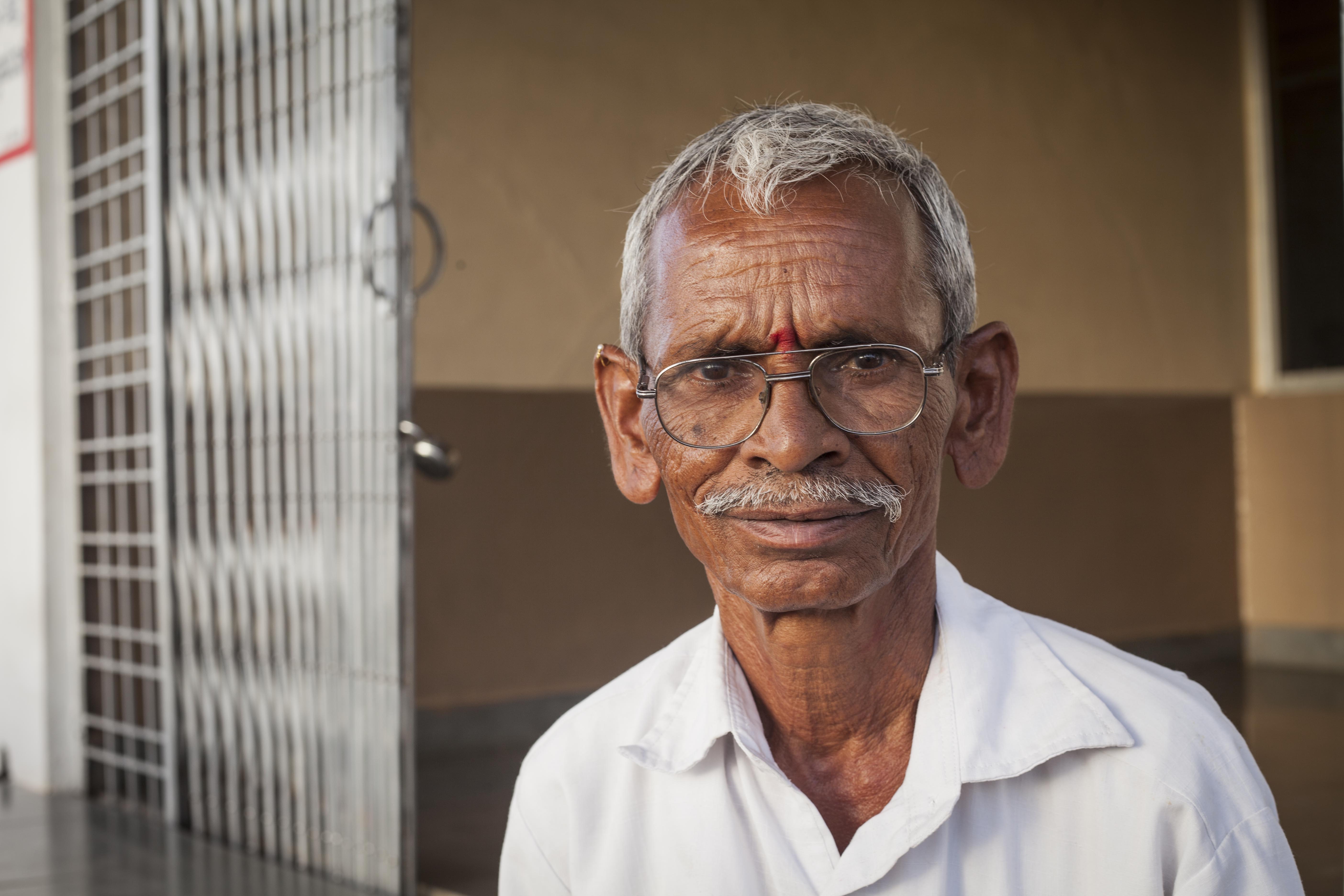
Clamped to the centre of the hall were faded photographs on a calendar. Pages fluttered in the breeze. Their corners had worn out. Shyam Rao adjusted his gold-rimmed spectacles and read the newspaper. He looked at us with weary eyes. Like most mornings, his blue slippers hung loosely from his feet.
Some days, we spoke in many languages. For, we couldn’t speak his, and he couldn’t speak ours. We sat for hours beside each other stringing words we knew into phrases he understood.
A smile lingered on his face when no one walked these halls.
“I have a son. He works as a coolie,” he told us one morning. Horns blared in the heat, and three vehicles came to a screeching halt outside the bungalow. It was 9 am. Some men emerged from one of the rooms reeking of alcohol.
“They want your room,” whispered Srinivas to us.
Remorseless grunts led to slurred threats; hoarse whispers turned into a faded whirl of abuses when we heard them pleading with the men. We rang Hampanna and informed him of the situation. He arrived shortly apologising for what had happened. He had informed the nearest police station and officers were on their way to the Inspection Bungalow.
In an hour, we heard a feeble knock on our door. It was thatha. His lips quivered; he bowed his head down as he spoke. “They left,” he said hesitantly, “You can come out now.”
“They called me Sulemaga. I am as old as his father, and he called me names,” he said his voice cracking. His ran his fingers across the cracked walls with peeling paint.
“That’s what they all do. They are unkind people. They have nothing left in them,” he said rubbing his knees.
He had three daughters, he told us when we drove him to Chincholi that night. It was too late for him to walk alone. “All my girls are married. My son earns Rs 3,000 per month,” he said scratching his forehead, “I have 0.75 acres of land. It was my mother’s farm. I couldn’t grow anything last year. It didn’t rain. We waited but it never happened…”
***
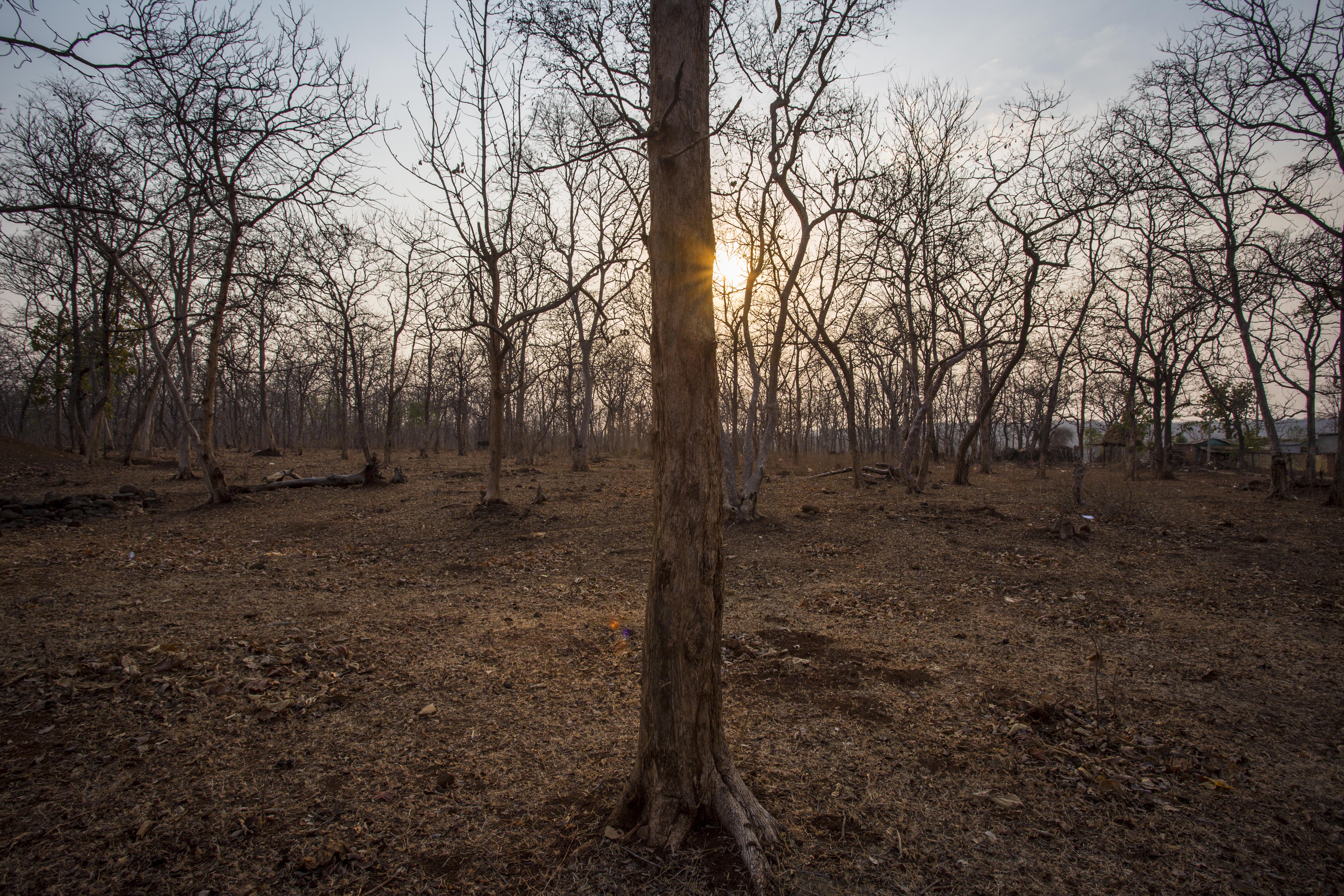
At 6:30 am, nothing stirred in the fields. Farmers stood beneath the tree. Still as the air, they looked ahead; blisters on their feet visible in the morning sun. A few more men joined them a while later as they lit their beedis underneath the banyan tree. They followed each other aimlessly in the heat. Some walked unheeded. We stopped there for a while wondering how long they would stay.
At 10 am, Thukappa waited for us near the market. “Beside the bus stop, there are several stalls set up by the villagers. All the Lambani settlements visit the santhe every week. They are just setting up their stalls right now. In a few hours, you won’t have any space to walk,” he said asking us to park the car near the office.
Dressed in their traditional attire, women walked around the bazaar gazing at plastic toys and edible sweets displayed by hawkers at the entrance. Here, everyone knew Thukappa. “Saar banni illi,” they called out to him. Some arranged paan leaves in symmetrical designs while a few set up handmade soaps in their stalls. Old women sold vegetables stacked neatly in piles.
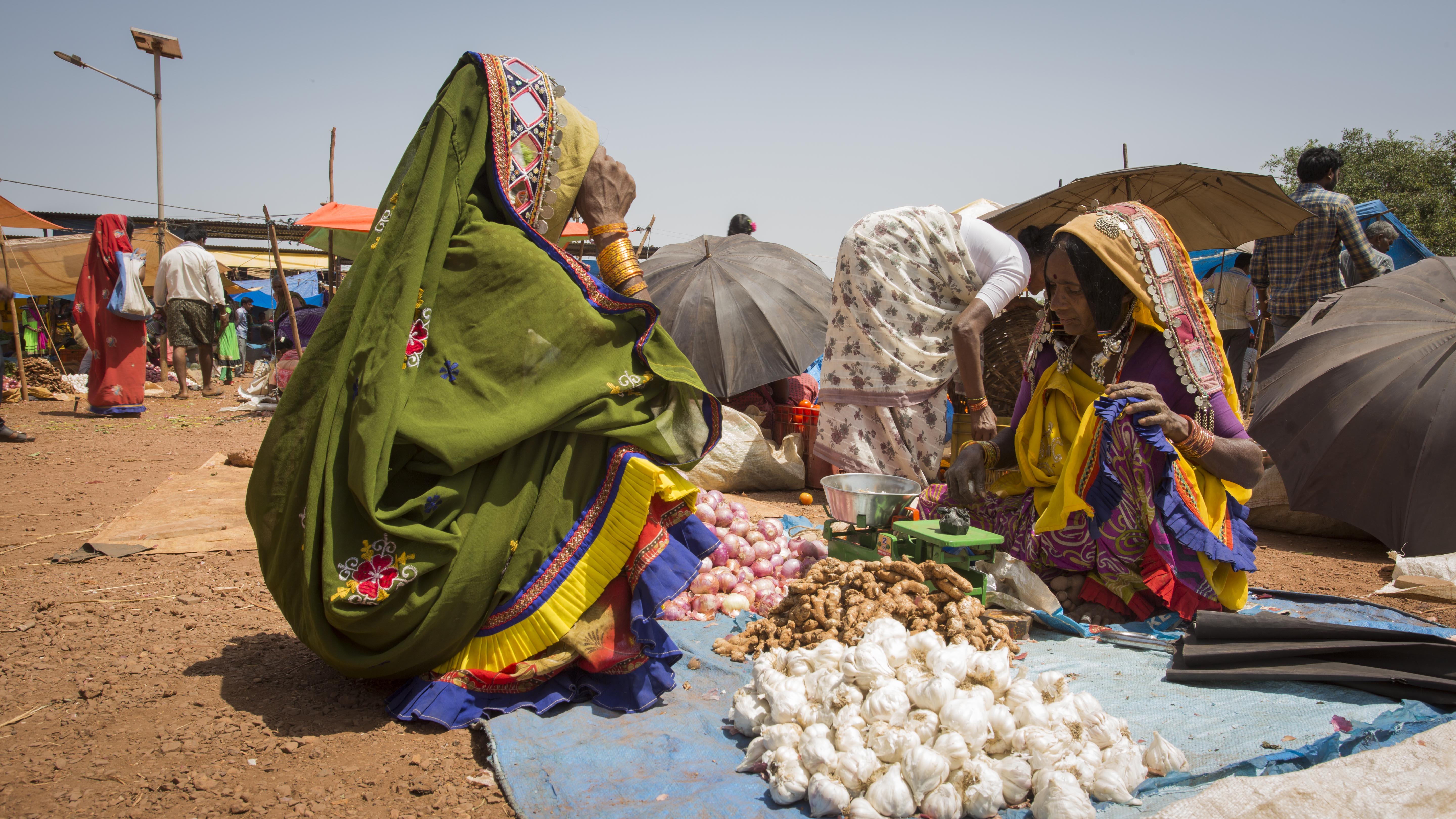
In the corner, a man struggled to push his cart towards the entrance as he placed two glasses of sherbet on its opposite ends. Lined in the back, towards the end of the santhe, were meat stalls. Butchers lifted their knives in the air as they skilfully chopped up pieces of meat and wrapped them in plastic bags.
Some even sold old trinkets and embroidered clothes. Chatting boisterously amongst themselves, a large group of Lambani women walked in tandem towards vendors that sold tobacco, dry fruits and coconuts. An old woman passed by us with a deep frown as she took a gander at fresh vegetables on display. A man sliced open a melon and handed it to her. She wasn’t impressed.
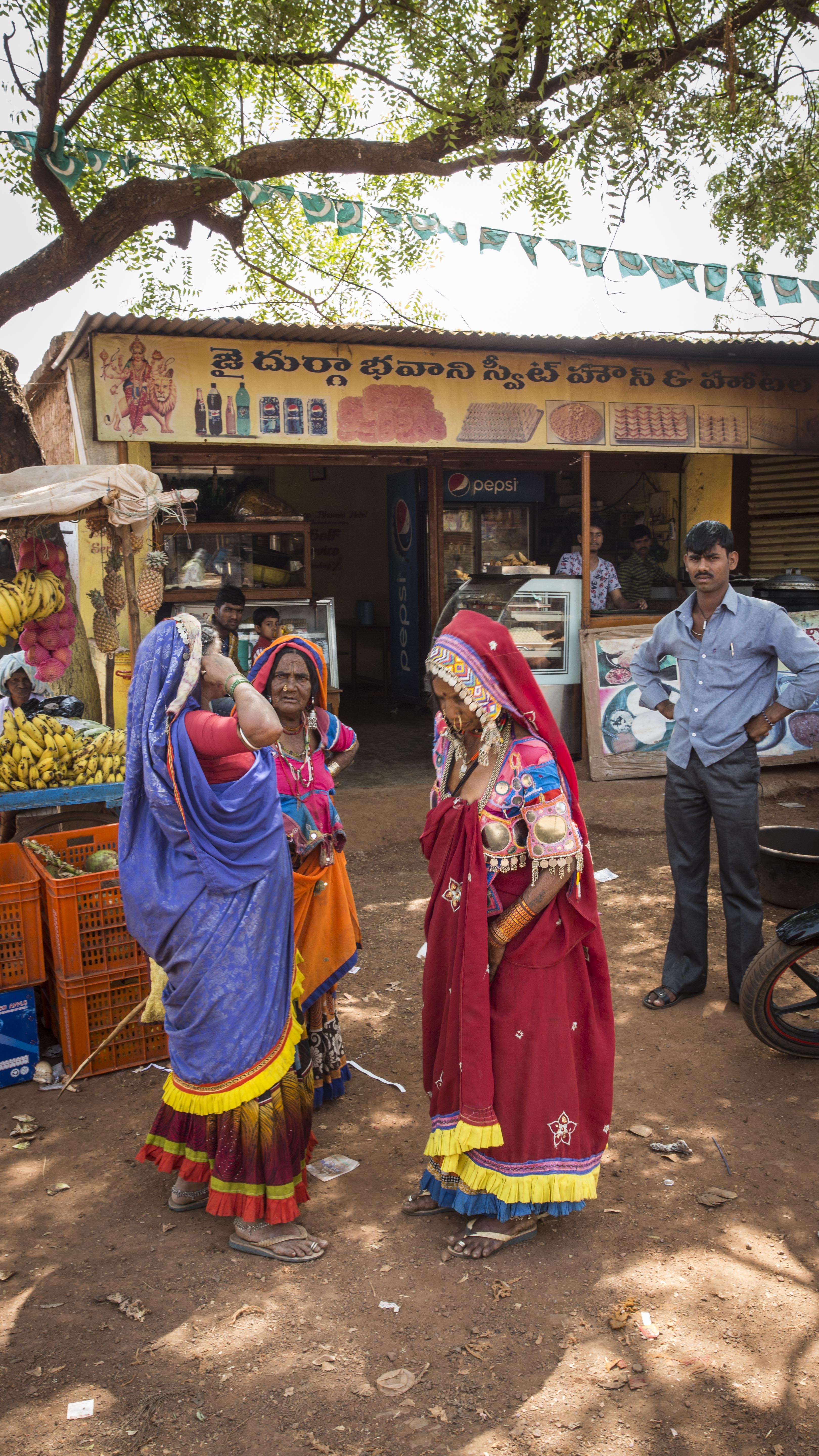
In two hours, we left from Kunchavaram and headed towards the forest. “Do you remember this abandoned settlement?” asked Thukappa as we drove past a colony of houses, “They were built to rehabilitate a village nearby. However, the area and houses did not suit their needs and they couldn’t live there anymore. Moreover, this particular settlement wasn’t struggling in comparison with the rest. Eventually, the project led to a complete waste of resources and time,” said Thukappa.
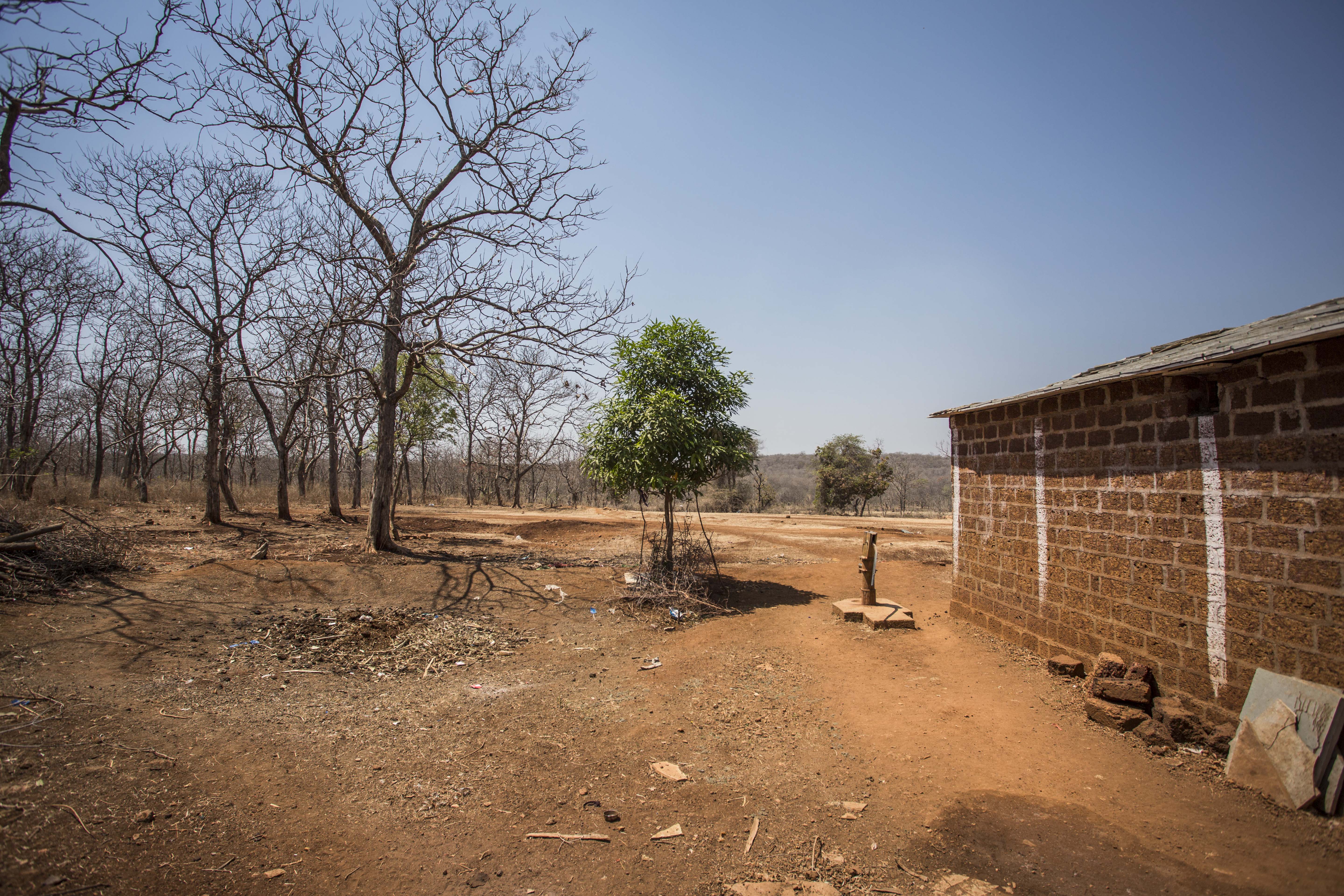
***
He picked up her shoes and ran waging a battle against those in the courtyard. His hair had gold streaks in them. His feet were bare. He hid behind the red and white house: the abandoned one in the alley where lurked no one at noon. Crouching behind the wall, he waited for them. They didn’t bother running after him.
At a stall, plastic tins of sweets lined the shelves. Some were soaked in syrup. Some were wrapped in paper. In the corner, sacks of potatoes lay unattended. There were packets of spices piled on old newspapers. On the porch sat farmers sipping tea from glass tumblers. They came here every day. At the counter, a man used old rags to keep flies off the shelves.
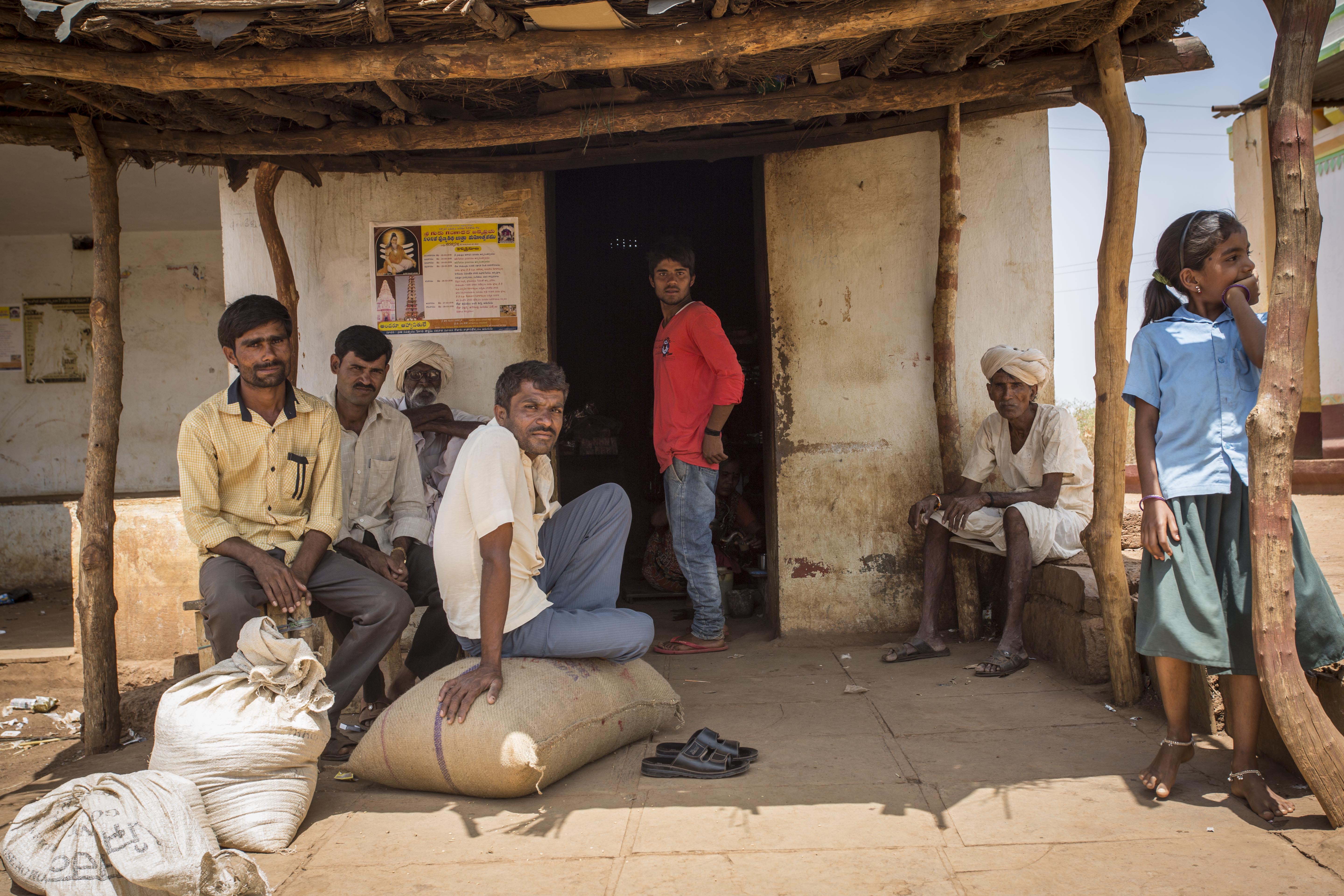
“Do you know where the family lives?” asked Thukappa as the men stood up to greet him. They knew who he was. They had spoken before. “They tried to sell their girl,” he whispered when they didn’t respond. It caught their attention. They nodded to each other and led us into a tiny alley where goats ran astray. The men followed us. Some more joined them.
A decade ago, Thukappa explained as we walked alongside the farms in the forest, one late evening, child trafficking thrived in Kunchavaram and Thandur. Families sold their children to brokers from Hyderabad. The trafficking racket was operational between the areas bordering Karnataka and Andhra Pradesh. Childless couples in the cities were easy targets. “They were desperate. Some were willing to do anything to adopt children. Little did they know, what it meant for those living here,” he said.
“Yaaru evaru?” yelled an old woman, “Are they from the government?”
“No. They are here to meet some family,” said a young man walking behind us.
The house had no rooms. The kitchen was outdoors. In this structure, the entire family slept, ate and survived. There were children trotting about from one corner to another. It didn’t look any different from the rest in the alley. Its roof was broken, and the walls crumbled at several edges. Men, women and children sat in the courtyard. An electric fan whirred softly in the corner. Where one home ended, and another began we couldn’t tell. Where one family left, and another lived we couldn’t see. Such was the state of this thanda and the rest in the forest.
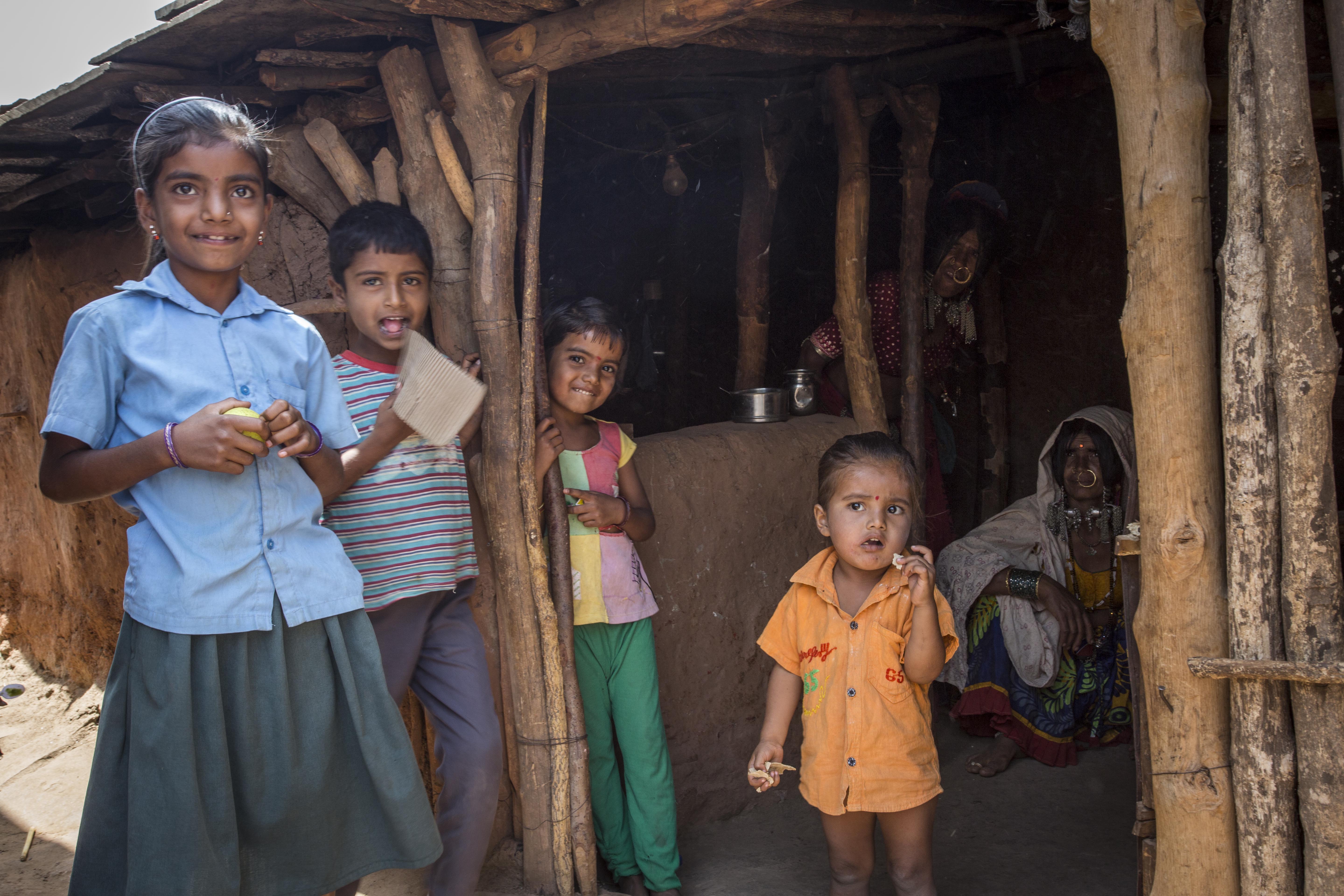
An old man stood before us with a perplexed look in his eyes. He wiped his forehead several times and disappeared into the house. He knew why we were here. Two little girls stared at us dumbfounded and giggled when we introduced ourselves to them. They were his grandchildren — Karishma and Reshma.
We heard long wails coming from inside the house. Gayatri was distraught. She refused to come out and fought hard to free herself. Her grandfather held her tight. He dragged her to the courtyard when the men around us yelled all at once, “Ye hi hai woh bachchi jisko bechne ki koshish ki gayi thi.”
“Many people come to visit us. She is terrified of cameras,” explained Bheem Setty, the president of the Gram Panchayat. He walked in moments ago asking the women to fetch us a jug of cold water. “When the incident came to light, hordes of cars lined the streets all the way into the forest. Everyone important was here. Ministers, higher officials, and officers – they all came to the village to visit us,” he added.
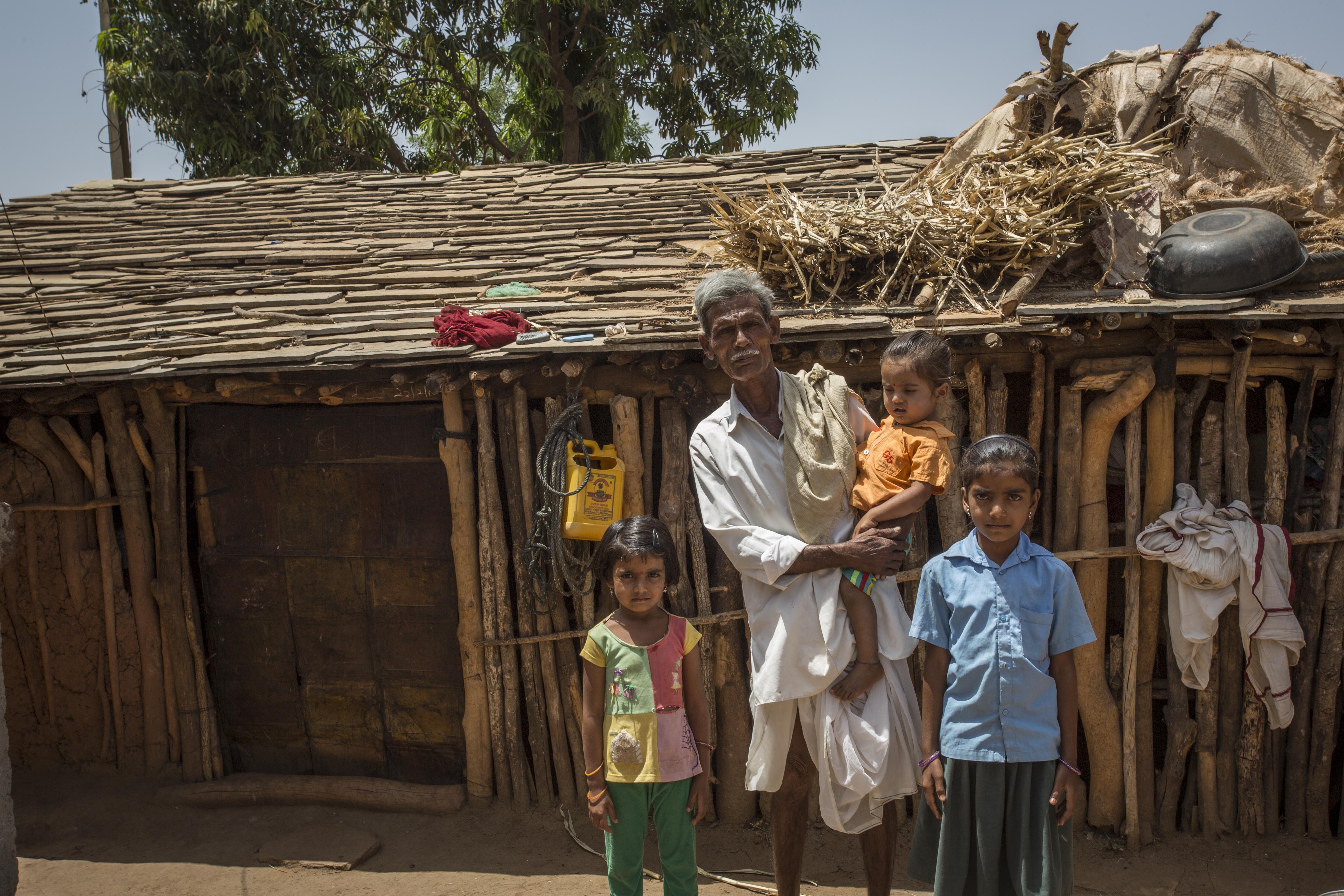
Gayatris’ parents no longer live with their children. Vittal and Kavithabai moved to Sangha Reddy in Telangana which is 50 km away. They both work in construction as labourers. She is raised by her grandparents. “We look after their children,” said the old man, “We have no choice. Someone has to take care of them. If they don’t work, we’ll starve. All of us. If we leave, the children won’t survive. So, here we are…”
Quite a commotion ensued as the women urged Seethabai to sit beside the children and grandfather. She staunchly refused to move. She yelled at us in Gormati. She was miffed with our presence. “If they’ll give me some money, then I’ll sit with everyone. Why should I get my photo clicked if I am not going to get anything? There were several like them who’ve come here before. They know the story already,” she said with spite.
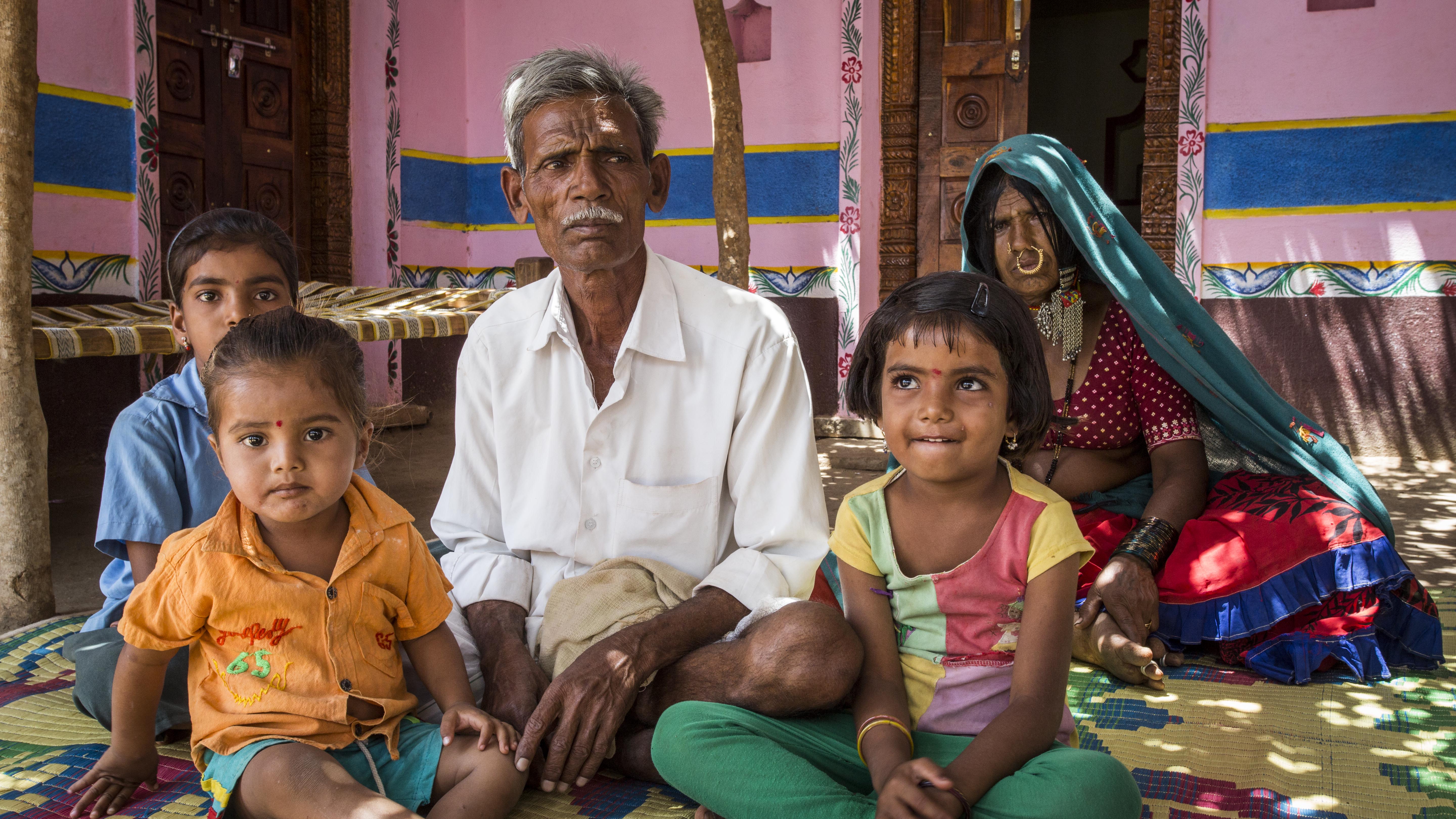
Her scowls didn’t go unnoticed. The others begged her to stop. Her husband seemed hesitant to talk. He cleared his throat several times. His neck was stiff, that morning. He hurt it a few days ago, he said carefully running his hand over it. “My name is Shivaram. And, I reside in Ontichinta Thanda,” he said, “I have one son and four grandchildren – three girls and one boy.”
He drew a long breath. “It happened three years ago. A few minutes after her birth, an offer was made. Her mother was still in the delivery room when a nurse asked her if she wanted to keep the baby. Her name was Seeta. She was Lambani too just like us. Toh baat chedne par, in logon ne bhi socha theek hai chalo de dete hain. They then came to an arrangement,” said the old man looking sideways at his wife. There was fear writ all over his face, and anger smouldering within her.
“How much money did they offer?” we asked them. At this point, the men shifted uncomfortably in their seats.
“They didn’t go through with it. So, it doesn’t matter. This isn’t a problem within our community alone. You have to understand that such situations arise owing to adverse poverty. Perhaps, this will showcase the weakness of our community. It was desperation that drove them to taking such a drastic step. Her mother was vulnerable and they took advantage of her. It was only later when the situation came to light that it was blown out of proportion since many higher officials came to visit us. With the parents gauging their inability to pay dowry, they resort to such measures. Shaadi karne ko problem hota karke, isliye humara logaan ye karte hain. This is the state of our world, sahib ammavare. That is the only reason that a boy is preferred. He will earn for his family. A daughter will have to leave this house someday so might as well give her away now.”
The grandmother stood up. Her gait was unsteady. She balled her hands into fists and lunged forward. “Rs 200,000,” she spat in anger, “That’s how much she fetched me. What are you going to do about it? All of you have come to destroy the reputation of our family and community. Everyone comes here asking us these questions.” People around her rushed to pacify her. She sat down muttering to herself.
“Maybe you shouldn’t have tried to sell her then,” whispered a young boy to another as they sniggered at her. The elders shooed them away.
“This wasn’t done as a part of any business arrangement. Isse humari kamzori sabko samaj main aayegi isliye woh gussa ho gaye,” repeated Bheema as he had done several times that afternoon.
We told them we understood their plight. We didn’t. We told them we didn’t judge them. But we did. For, we could never understand what it meant for a mother to let go of her child forever; what it meant for a father to see his children starve. What drove them to such madness, we’d never understand.
The weather turned rogue almost mimicking the gathering before us. “Someone had told them that their child would live in an ashram. That’s why they considered the option. Ten to twelve years ago, there were several cases of families selling their kids for money. Each child was sold for Rs 500 or Rs 1,000. A voice was raised on a national level against this practice,” Bheema said with a nervous cackle.
Our emotions betrayed us at this moment. We didn’t stay hidden anymore. There was no ashram. And, they knew it. So, did we. Nobody gives a child to the ashram as soon as they are born, said Thukappa later that evening. “Dr Gaffar was the attending doctor that day when they tried to sell Gayatri. The nurse would have gone through the deal when the news spread to the police station opposite the hospital,” he recalled, “They conducted an inquiry and accused the doctor of partaking in the racket. That’s when the nurse spilled the beans. The family then decided to cooperate with the officials. This was a huge deal since everyone was under the impression that such incidents no longer occurred in Chincholi anymore.”
For days thereafter, authorities visited the thanda and conducting meetings to control the situation. They also hoped to put rehabilitative measures in place to improve the condition of such families. “They were given some compensation by the government. But what’s the point? You have returned a child to a family that is incapable of surviving on their own. Besides, there have also been cases of nurses exchanging babies in the hospital at the request of parents. Those who want boys will pay them handsomely. Money will not solve these issues.”
“It was a mistake,” said the grandfather holding his head in his hands, “No parent will ever abandon their child. And, there are many like us. We aren’t the only one.”
“Many people come here and question them. So, she gets upset,” said Bheema pointing at the Seethabai crushing tobacco in her hands.
“Despite being poor, we will continue to fight hard and live our lives,” said the grandfather interjecting the conversation here and there. “It doesn’t matter what happened in the past. We will still move ahead. I try and keep faith alive in my heart. But poverty can make one question their faith and even morality. In the face of hunger, there is no right or wrong. It’s just survival.”
People don’t have much land now. There was a time when their grandfathers did well for themselves. Even they came from decent families, they said with pride. They had everything at one point. Everything that one could ask for in these forests. Soon, the population grew and there were more and more people to look after. Their lands deteriorated and the climate changed. Their lifestyle dwindled. “We lived off the jungle. We would procure flowers, fruits and vegetables from the forest. But now it’s impossible for us to continue practising our ancestral lifestyle. We can’t even enter jungles these days since they have been declared as protected zones. The only thing we are allowed to do is gather firewood. Neither can we take anything from the forest nor can we live in these spaces. So, we have to migrate to cities to live. In the monsoons, we invest in a few crops and spend close to Rs 10,000 to 15,000. We are unsure if it will yield us a good harvest since we are completely dependent on the weather. But we try, year after year,” he said.
“Nowadays, we have been receiving a lot of help from the government,” said one to another, “We get crop loans.”
“The government doesn’t pay us on time,” said the others beside him shaking their heads vehemently at his suggestion, “Moreover, if we wish to take larger loans, it is impossible for us to do so since our land has no value nor do our houses. This entire area belongs to the jungle and here’s where we are expected to make a living. So, our only option is to do construction work. In one village, if we have at least two people who are doing well for themselves then the community will improve. Humara koi sahara nahin hai idhar. Even if you go to the others residing in neighbouring settlements, you will get similar responses from everyone.”
“Everyone is poor. Not just us,” said the women adjusting their veils.
“At one point in history, we used to have a malik in Andhra Pradesh who would lend us money and then we would procure crops for our farms. It still exists to an extent even today,” said an old man rubbing his feet. He listened to everyone before him and nodded in agreement. We all have different perspectives on life and different ways of dealing with situations, he said to them.
“Acha ya bura, kamzori ya majboori, insaan ko tab hi ehsaas hota hai jab woh khud ye zindagi jee raha ho. This is what I have understood so far,” said Bheem Setty to everyone, “This is my family. I too have to make ends meet. We are not different from one another. We are all related by blood. We don’t live differently.”
They remained silent; their poignant pauses interrupted by peals of laughter emanating from the corners. Children ran hither and tither chasing each other with pebbles.
***
There is no hospital here. A few women were entrusted with certain responsibilities to aid in delivery and pre-natal care. These are medical representatives who help women throughout their pregnancy. They also spoke of schools that barely stood up and teachers who never visit the thanda. We wondered aloud if they ever raised a question on their continued absence. “It has been eight months since I assumed this position. According to the strength of our school, we need four teachers. We have one. We are currently waiting for these positions to be filled up. Hopefully, by June this should be resolved. Ye kaam karna humara farz hai. It is only through education that we can improve our economic condition. This will affect our future generation. We are trying everything we can. We have a few graduates in our thanda but most of them can’t afford to put their kids in hostels,” said Bheema.
He graduated twelfth grade in 1984. But he cannot afford to send his children to school today. For, expenses have increased exponentially. If they can’t pay the fees, children return home. A few boys have managed graduate high school but the girls haven’t been able to do so. “People only study till 12th grade. If a child fails, then he or she is expected to drop out. We have to send our kids to Chincholi or Gulbarga. And, many return home. If they score well, then the government and the school will accommodate them. However, if they fall out of the system, then they are doomed. They start working in hotels or become masons. Some have gone to Mumbai and other cities. There are many such students in the thanda. Apne sahara apne hatheli se jeene ke liye bohat se log hain aise,” he explained.
***
They held hands. In an hour, we’d find them walking into the forest in silence. Something had happened here. And, they knew it. But they never asked him. Their grandfather had enought to be worried about. Every time, Gayatri broke down they giggled at her. It amused them to no end that the presence of others caused her such distress. He walked behind them slowly. We stared into the woods for a while until they disappeared.
“There are many who come here like you. They give us tonnes of advice. But that amounts to nothing. Our life continues to remain the same. We have many representatives in the government too. And, people keep trying to elevate the status of their respective communities. But things don’t happen at the pace we hope they would. Humari asli bimari yahan par bole toh jeena ka zariya nahin hai. We have to become self-reliant and independent. We are still 1000 years behind with respect to awareness and education. Our children and grandchildren will live in different worlds altogether. During the British Raj, the situation was quite different. Svatantra bolke naam ke liye hai hakeekat ke liye woh svatantra ka mazaa nahin le sakte. Aur yehi humara dard hai,” said Shivaram as we stood up to leave.
In the dead of winter, months later, nothing would change. Gayatri’s parents would continue working in cities building structures for people they didn’t know. There’d be many like them in those places. The ones who hope to go home someday.
“You won’t come back here. Nobody ever does,” he said wrapping his hands around him.
“When you tell our story, tell them what you saw. Tell them we are good people…”
“Tell them the truth…”
(to be continued…)
‘Rest of My family‘ is a non-profit social-work-through-art project. If you like our work, and wish to support it, you can help us continue by donating here.

